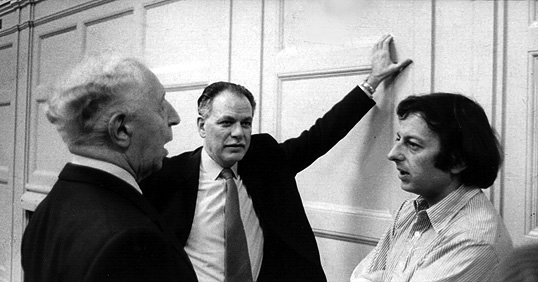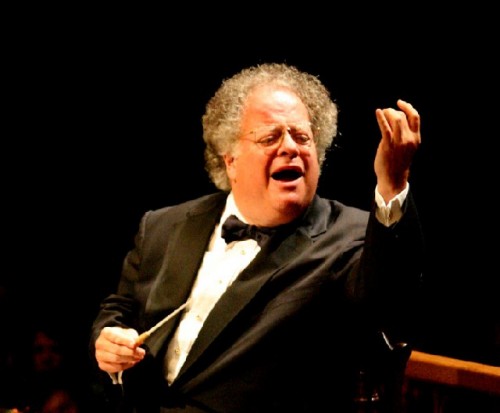Roger Wright last night announced the new heights attained by this season’s Proms.
Contrary to expectations, in a summer without the Berlin or Vienna Philharmoic, the Concertgebouw, Cleveland and other big bangers, attendances actually rose to a record 94%. That’s 2% up on 2010, 3% up on 2009.
More than 300,000 people attended classical concerts over seven weeks.
52 out of 74 concerts were totally sold out. Two million watched one of the concerts on BBC2 television.
The downside? There isn’t one.
But just wait for next year when the Proms meet the Olympic Games.

Here’s today’s press release:
![Picture (Metafile)]()
Press information issued 9 September 2011
Record-breaking season for BBC Proms 2011
- 94% average attendance for main evening concerts in Royal Albert Hall
- 52 of 74 concerts in the Royal Albert Hall sold out
- Over 300,000 attend the 86 concerts in the Royal Albert Hall and Cadogan Hall
As the 117th season of BBC Proms approaches the world-famous Last Night of the Proms on Saturday, Roger Wright, Controller, BBC Radio 3 and Director, BBC Proms, announces that it has been a record-breaking season.
Average attendance for the main evening Proms in the Royal Albert Hall this year was 94%, compared with 92% in 2010. 52 of 74 concerts in the Royal Albert Hall sold out, three more than the previous year. With two concerts to go, over 300,000 people have already attended concerts at both the Royal Albert Hall and Cadogan Hall.
Over 36,000 people bought tickets for the first time and more than 5,000 under 16s attended concerts across the season, not including the free sold out Horrible Histories Prom aimed at families. Record numbers of tickets were sold on the first day of sales with over 87,000 tickets purchased.
Roger Wright, Director BBC Proms, says:
“I’m delighted that the 2011 BBC Proms have been so successful with audiences, particularly given the large amount of new and unfamiliar music in the broad range of programming. The strong attendance figures are a testament to the adventurous spirit of the Proms audiences, their continuing eagerness to embrace such a wide range of music and the great value for money which the Proms offers thanks to the ongoing commitment of the BBC.”
The festival continues to offer low ticket prices, broad programming and creative use of interactive technology, this year doubling the number of BBC Proms social media followers. The Proms offers an extensive learning programme with a rich offering of daily pre-concert and participatory events to enrich the audience’s experience and reach new and young attenders. Sir Henry Wood, founder-conductor of the Proms, believed in making the best-quality classical music available to the widest possible audience and that ambition remains central to the BBC Proms today.
Coverage on BBC television built on the new initiatives that were introduced in 2010, with context and presentation focussing on the musicians themselves and the stories behind the music. Katie Derham has been the face of the Proms on BBC TWO for the second year and the BBC FOUR Proms have been led on screen by Charles Hazlewood, Suzy Klein and Petroc Trelawny. Concerts will have been broadcast across BBC ONE, BBC TWO, BBC FOUR, CBBC, BBC HD and all services are available to listen and watch again on bbc.co.uk/proms and via the BBC iPlayer. With two major television broadcasts still to come, viewing figures are strong and will be announced in full next week.
BBC Radio 3 broadcasts every Proms programme live, with an ambitious range of contextual programming around the music, including many of the Proms Plus events as well as interviews, talks, essays and features. For the first time this year Radio 3 has offered a downloadable Proms Music Guide in which a number of the station’s presenters introduce a work featured in the Proms concert of the day, creating an indispensable guide to some of the best loved music in the classical repertoire
The BBC Proms remains committed to new music with 12 world premieres including nine of the 11 major BBC commissions, and a further 14 key premieres this season.
Highlights of the season included the return of Gustavo Dudamel and the Simón Bolívar Symphony Orchestra, two Brahms concerts with Bernard Haitink and the Chamber Orchestra of Europe, two concerts with the Budapest Festival Orchestra and its founding conductor Iván Fischer, Late Night solo Bach recital by violinist Nigel Kennedy, the free family Horrible Histories Prom and the first ever Comedy Prom, hosted by comedian and pianist Tim Minchin. The opening weekend included the first Proms performance of Havergal Brian’s gargantuan ‘The Gothic’ Symphony, featuring the combined forces of around 1,000 performers, while a focus on film music saw the return of John Wilson and his renowned Orchestra, as well as the debut of the inimitable Spaghetti Western Orchestra. Other visiting orchestras included the Pittsburgh Symphony and Philadelphia Orchestra.
For further press information please contact Rebecca Driver or Camilla Thornton 020 7765 4714; rebecca.driver@bbc.co.uk; camilla.thornton@bbc.co.uk
Notes to Editors
The 2011 Proms included 74 concerts in the Royal Albert Hall, 12 Chamber Music Proms and Saturday Matinee concerts at Cadogan hall, and five Last Night of the Proms celebrations across the UK. There were a further 80 Proms Plus events – talks, workshops, free performances and activities – offering extra context and insight to audiences on every one of the 59 days of the season.
The 2012 BBC Proms run from Friday 13 July to Saturday 8 September.
Booking information online at bbc.co.uk/proms
Today’s Jewish Chronicle breaks the news that a player in the LPO has been suspenced by the orchestra after she launched a diatribe against three Israel Philharmonic musicians during a pre-Proms event last week.
The player has not been named, and I see no reason here to add to her punishment, already severe.
In the same issue of the JC, I amplify my own position on the single-issue sympathy tourists – Jews who, after one carefully guided visit to the West Bank adopt the view that Israel is the root of all evil. Read it here.
Roger Wright, head of the BBC Proms, announced tonight that, as part of next summer’s cultural Olympics, Daniel Barenboim will conduct a complete Beethoven cycle at the 2012 Proms – culminating in a Ninth Symphony on the night the Games begin.
The orchestra, symbolically for the goodwill element of the Games, will be the West-East Diwan.

Three Paris judges agreed that he had abused people in several incidents with antisemitic taunts.
Galliano, saying he was drunk and drugged, had no recollection.

The judges ruled he needed treatment more than censure. They fined him a piffling six thousand Euros, about half of the prosecution’s demand – much of it, for some reason, suspended.
Galliano did not bother to turn up for sentencing. The only apology he offered was ‘for the sadness this whole affair has caused.’
To himself mostly, is what it sounds like. He has finished drug rehab and is ready for career relaunch.
Justice done, or dodged?
Tributes have begun to trickle in for the tenor Salvatore Licitra, who died after a road accident, aged 43.
The conductor Riccardo Muti told Corriere della sera: La notizia della prematura scomparsa di Salvatore Licitra mi lascia costernato. […] Era un artista a cui mi legava una affettuosa amicizia maturata in moltissime collaborazioni in teatro e in disco (I am deeply dismayed by his untimely death. This was an artist with whom I had an affectionate friendship that matured through many collaborations on stage and disc”.
His colleague Zubin Mehta was more fulsome:
“I’m just devastated,” said Mehta. “He was pure pleasure for conductors. He was an excellent singer, an intelligent musician and a wonderful actor on stage. .. I’m so sorry, I can’t express in words how much it hurts…. (He had) a very beautiful voice and musical intelligence, which comes naturally to him. His pronunciation was similar to that of Pavarotti. I say Pavarotti because beyond everything else, he had an unusual pronunciation of the Italian language. Salvatore had it too, very similarly. He had great dictation, a wonderful sense of music. For me, as a friend and conductor, I feel it’s a very big loss.”
The way ahead was laid out by Max Hole, chief operating officer of Universal Music, at a party celebrating the market-leading label’s move to Berlin.
Here’s what Max said:
“Since I took responsibility for Universal’s global classical music operations, we have renewed our commitment to developing classical music and our artists around the world. We have put classical music back into the centre of our business. I believe that music matters – it’s not just an economic imperative. Music is important, both culturally and emotionally. Music is the soundtrack to people’s lives. We need to protect it. The move back to Berlin is another step in our total commitment to Deutsche Grammophon, to its artists and to music.”
That’s the biggest vote of confidence any classical label has received in 15 years. It deserves universal applause.
Myself, I would join in with both hands, if only DG had not just sent me a cafe-music release titled Cigala&Tango and an Indian-pop compilation by Anoushka Shankar. Neither fulfils any conceivable definition of classical music. DG has some way to go to rid itself of Chris Roberts habits.
Max, just say no to this stuff.

Max Hole with a recovering tenor
Andrew Balio has sent me pictures from the time he spent with Licitra as assistant conductor to Fabio Mastrangelo during a 2009 production of Aida in Taormina.
Andrew, who is principal trumpet at the Baltimore Symphony Orchestra, describes Salvatore as ‘a great guy to be around, hilarious….more of a brass player personality. Just really down to earth and funny. ‘
The unnamed girlfriend is the one who rode pillion with Salvatore the night he crashed his Vespa. She wore a helmet and came off unharmed.
The death has been announced of Harold Lawrence, the only American to manage a London orchestra (so far as I’m aware).
He was appointed to the London Symphony Orchestra in 1967, at Neville Marriner’s suggestion, after Ernest Fleishmann departed in a players’ bust-up. He lasted six years in the job, which was good going in those swingdoor days. His main coup was securing Andre Previn as chief conductor, which seemed a trendy thing to do at the time until Andre outstayed his welcome.
Harold went back to the US in 1973 to become manager of the New York Philharmonic for two years, before taking up the same role at Buffalo, where he gave Michael Tilson Thomas his breakthrough as principal conductor.
He died in Oakland on August 22, aged 88.

Harold (on the right) with Mercury Records chiefs Robert Fine and Wilma Cozart

Harold, between Rubinstein and Previn. Images from http://www.btstack.com/HaroldLawrence.html
Howard Mandel has sent mea private link to Ukraine’s finest, titled CountPoint.
It’s not as sleek or icy chic as Norway’s Klassisk, and you have to scroll down rather than across to follow page by page, but it’s a whole lightbox brighter than I expected to be seeing from a publishing venture in Kiev. Well done, those guys.
They don’t get bigger than Siemens, and Siemens have had enough.

Four years of the video wall on the Green Hill failed to deliver the commercial impact the electronics giant expected, so the plug is being pulled. Now. Without notice. ‘We’re looking at other projects and told the festival management so months ago, ‘ is what Siemens said through tight lips.
Bayreuth said nothing.
Here’s Die Welt on the subject.
A while back, in the Wall Street Journal, I described the sad history of James Levine at the Boston Symphony Orchestra:
Barely had he raised a baton, though, when persistent back complaints, aggravated by an onstage fall in 2006, resulted in repeated cancellations. Amid press speculation and public discontent, Mr. Levine refused to announce any decision on his future. Offered a contract renewal in 2010, he left it on hold. Neither the board nor the players of the Boston Symphony Orchestra knew whether Mr. Levine was music director or not. Week after week he refused to decide, crippling player confidence, alienating the audience and undermining his hard-earned reputation for competence.
Boston has yet to recover from Levine’s vacillation.

That sorry story is now being repeated at his main stronghold, the Metropolitan Opera, which has dithered from one health episode to the next over the past 11 years without confronting the obvious and the necessary. It needed to put in place a successor strategy and failed to do so. The Met has officially ascribed Levine’s latest withdrawal to a mishap, a fall in the street, telling the New York Times:
He had a major operation last year for spinal stenosis, or compression of the spinal cord, and two follow-up surgeries, Mr. Gelb said he had canceled Tuesday’s rehearsal, which was to have been the conductor’s first day back, just the night before. “I didn’t want it to come out in dribs and drabs,” he added. “I wasn’t exactly sure what his condition was.”
That seems, at the least, disingenuous. Two people close to James Levine have told me he is suffering from uncontrollable shaking as a result of his various condition. The musical world owes him an enormous debt for his 40 years at the Met and wishes him well in his time of trouble.
But the runes here are blindingly clear. James Levine is in no fit condition to conduct. It will take a miracle for him to return. There is a musical vacuum at the Met. It cannot be allowed to prevail for long.
The Guardian today printed Steven Isserlis’s letter denouncing the attack on the Israel Philharmonic at the BBC Proms.
It held the letter for five days until two ‘balancing’ responses could be published from confirmed opponents of Israel. I guess that coforms to the paper’s editorial line.
Here‘s the link.









